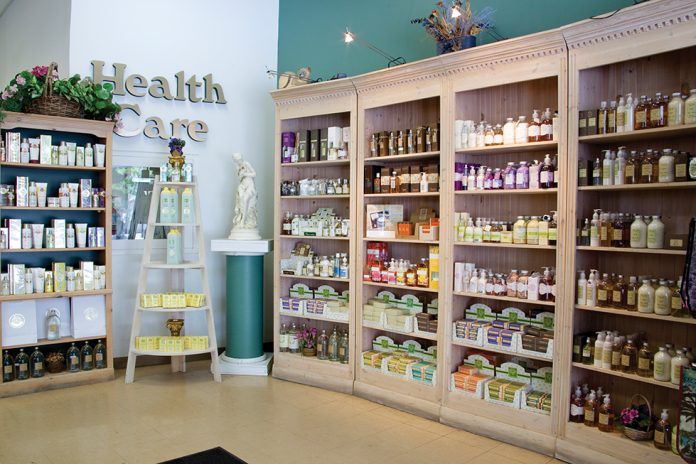A class Act
Ten years after gracing our first cover, Toronto’s Markie Pharmacy continues to thrive based on good, honest and professional service
By Carlos Weigle
Wardrobe Styling by Kelechi Achonu
Mark Rosenhek is a fortunate man: he does what he has always wanted to do (since he was a little kid) and still enjoys it immensely. His career as a pharmacist started at a Shoppers Drug Mart in downtown Toronto, where he spent almost 15 years. Eventually he decided to open his own independent pharmacy nearby, and many of his customers opted to follow him. When Shoppers closed their location, a large clientele was left unattended. Those downtown customers were probably very happy to find out Rosenhek was setting up shop in the neighbourhood. That certainly helped Markie Pharmacy get established. However, it was just a good start; you need more than that to keep yourself in business.Ten years measured in business time can be close to an eternity. Long gone is the era when stores would remain open for decades without having to constantly reinvent themselves. Life cycles have become increasingly short and consumer loyalty is very fleeting. That’s why it’s refreshing to know that the pharmacist who was featured on our first cover, 10 years ago, is not only still open for business, he’s doing very well, thank you
Rosenhek had a brilliant idea: focus on natural health and alternative medicines at a time when very few pharmacies were interested in that. “Right from the beginning, I knew I didn’t want it to be just like another pharmacy and we started offering alternative products, just when the trend towards natural health was taking off. The timing was wonderful. You know they say ‘timing is everything’ and that is true,” says Rosenhek.
The decision to go solo was certainly the right one. As he explains it: “I make a better living here doing half the volume I did [at Shoppers Drug Mart], because of all the expenses I had there; I had a staff of 25 people, for instance.”
Building relationships
Another very smart move was creating relationships with the naturopathic and homeopathic doctors practising nearby. Before Rosenhek opened his doors in the posh Yorkville area, many of them had to carry products since certain brands were hard to find elsewhere. Most of the practitioners were happy to let a pharmacy take care of that part of the business. “They’re grateful that they don’t have to be sellers, because they’re too busy, their business is treating clients and not being salespeople,” says Rosenhek.
The relationships have only expanded and grown stronger over the years. However, changes were inevitable. One of the most noticeable ones is that big pharmacy chains have also been embracing the natural health trend. As Rosenhek puts it: “You go into a Shoppers Drug Mart or a Rexall Pharma Plus now and you can tell they’re less afraid of carrying some of these products that used to be the domain only of smaller pharmacies and health food stores. Mass marketers are getting into – yet still in a limited way – buying from the same suppliers we are.”
Those big companies are, evidently, in a better position to negotiate pricing, solely based on their sales volume. Rosenhek paints the picture: “If someone comes in and says, ‘gee, I bought this $2 cheaper somewhere else,’ we’ll match the price. However that’s not the only issue.” He adds that, “if people want a product they can’t find elsewhere, they will buy it no matter what the price is, and if they want information about it, they’ll come and ask a pharmacist.” That’s where professionals such as Rosenhek can have the upper hand. “Pharmacists at the big chains have many other things to worry about and they really don’t understand too much about homeopathy or herbals,” he points out. “I still think we have an advantage there, however I also think that was the biggest change I’ve seen happening in the last 10 years.”
Needless to say, it wasn’t the only factor that impacted the industry. The new regulations on natural health products, passed in 2004, has had a lasting effect as well. Rosenhek feels times are only going to get tougher, since the authorities seem determined to enforce those regulations. As he points out, “we bring in a lot of products from the U.S. and most of those manufacturers will not comply with Health Canada’s regulations on natural health products. And [the products] will just be banned, illegal. It’s the same with companies from Europe; very few European companies will comply.”
However, Health Canada seems to be only part of that troubling puzzle; other organizations might become involved too. Rosenhek explains: “Health Canada is going to enforce the regulations in the health food industry, yet the Ontario College of Pharmacists, for example, will enforce them from the pharmacy’s point of view, which means there will be at least two different inspection bodies.”
Not a grocery store
Another interesting change observed in the industry was diversification, the inclusion of other items such as groceries. Rosenhek never thought about going down that road: “Other pharmacies can sell food as much as they want. We’re not a grocery store. I pride myself in having a mix of products that are not food.” Rosenhek mentions staffing issues and low margins as some of the reasons that discourage him from selling that type of product. Of course he has other reasons too. “I don’t think that’s the business I want to get into. I didn’t go to school to sell bread, milk and eggs,” he says.
Markie Pharmacy’s success story proves it is possible to do well by sticking to your guns and being the best at what you do. “People come in and they get polite, quick, accurate service in filling their prescription and that’s a draw for them. As opposed to go into a chain where they may tell you to come back in an hour, you’ll get your prescription here in five minutes,” he explains. The fact that the pharmacy is located in an upscale area also determines the types of customers it gets and what their priorities are. “People around here are not concerned about the price of the prescription,” describes Rosenhek, “they want it accurate and they want it fast. That’s what’s more important to them.”
Rosenhek firmly believes that branching out would not have benefited his business. “The profit driver in any pharmacy is the dispensary,” he says. “It’s not the front store only, it’s the prescriptions. That’s changed quite a bit with the new government regulations because of the reduced professional allowances that pharmacists are now collecting. So it has impacted the bottom line, yet, the guts of any pharmacy is still the dispensary.”
In that respect, he adds “we’re fortunate that we have a profitable dispensary volume and we also have a thriving front store with not only supplements – also a large selection of skin and bath products. If you have to choose one or the other, you’d much rather have a busy dispensary and less of a front store.”
Some practices are, according to Rosenhek, becoming increasingly alarming: “I know there are pharmacies and health food stores that people go into and have a list of things to buy and the person behind the counter will say, ‘You don’t need this, you don’t need this, you should buy this and this,’ and they contradict what the practitioners told the patient to get due to the fact that they don’t carry the products being prescribed. We don’t do that. If someone wants A, they get A. If they want B, they get B. If they want information as to which product I think is best, then of course I will give them my opinion.”
Trends, trends and more trends
One thing that can’t be avoided is trends. Customers will be affected by them and will look for the latest, hottest item to hit the shelves. Trends these days tend to invade the market furiously yet fizzle almost as fast. Rosenhek recalls how echinacea, for instance, used to be so popular 10 years ago and now it’s not anymore. He also knows what the current stars are: “Glucosamine was not very well-known for a while and now it’s a top seller in our pharmacy. Vitamin D tablets also do very well. The same goes for fish oils – so much so that we carry about six different brands of it because people want them. If you come into this pharmacy and you want this particular brand, we’ll get it for you because I don’t have a problem ordering it for you. I don’t have a head office; I’ll get you whatever you want. And that’s what people like.”
Another transforming factor in the industry – also seen in other industries, for that matter – is the tendency towards customizing. “We’ve been doing more and more specialized ordering in the last 10 years,” says Rosenhek. That, of course becomes an advantage to him: “Customers will say ‘I go to my local drugstore and they won’t order it. I can’t get this there, can you get it for me?’”
Compounding is another area that has certainly been a cornerstone at Markie Pharmacy. Not only that, it has become a growth factor. “Especially in terms of topical hormones,” describes Rosenhek. “That’s an area that has mushroomed in the last 10 years. We used to prepare 10 topical hormone creams a month, while now we might do 20, 30 and up to 50 a day!”
Success might make some entrepreneurs greedy. Not Rosenhek, though. Many times he’s been asked about opening new locations, yet he’s never been tempted enough to give it a try. He loves his store, his staff (most of whom have been with him since he opened his doors in 1993) and his customers, and just couldn’t stand not giving them his undivided attention. “It’s a fun place to work,” he says. “You never know who’s going to walk in the front door; from movie stars, to models, to singers, to professors, to politicians, you just never know. I love working here. I go away for a few days’ vacation and after a few days I miss it. So here I am, 35 years working as a pharmacist and still enjoying it,” beams Rosenhek.
He knows he could maybe update the store a little bit, especially since that swanky new Four Seasons Private Residences is being built a few steps away. However, being at such a prime location does have its disadvantages (aside from skyrocketing rent, of course). Companies will offer to make his pharmacy over…for hundreds of thousands of dollars! “I’m sure they do lovely work,” Rosenhek says, “but how much am I going to need to sell to make that four or five hundred thousand dollars? I don’t think customers are going to buy more just because the floor is sparkling. They’re buying more because of what’s on the shelf and how they’re treated.” A very straightforward answer from a pharmacist who still believes in old-fashioned – and much needed – honesty, hard work and treating people the way they want to be treated. With a smile and good, professional service.







